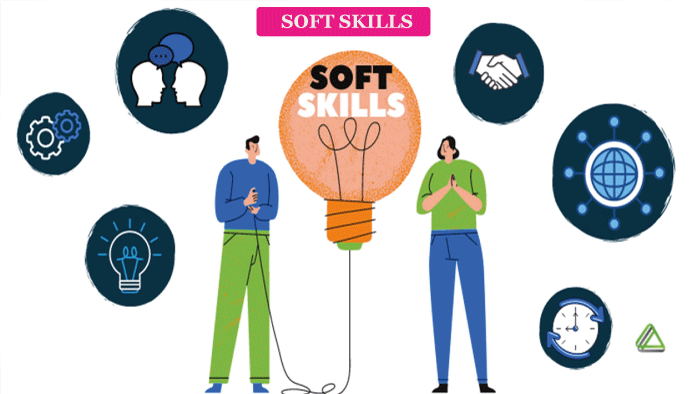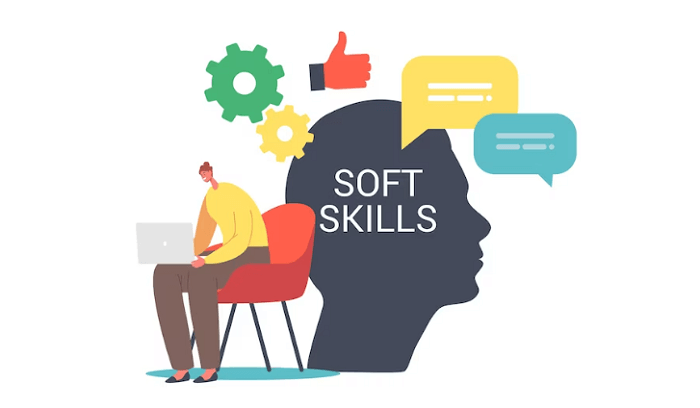Soft Skill Definition
Soft skills refer to a person's capacity for good interpersonal interaction, effective communication, collaboration, and emotional control. These abilities are necessary for the job and can help people advance their careers.

Types of Soft Skills
Soft skills are non-technical abilities that are essential for success in the job. The following list provides a general classification of a variety of soft skills.
- Communication skills- People who want to transmit information effectively and efficiently need to have strong communication abilities. These include the ability to communicate verbally, write clearly, and listen. Effective communication skills make a clear expression of ideas and opinions possible, which may contribute to the development of close connections with clients and coworkers. Additionally, these abilities support interpersonal influence and negotiation, dispute resolution, and trust-building.
- Interpersonal Skills- Interpersonal skills refer to the capability of respectfully and positively interacting with people. Empathy, active listening, persuasion, negotiation, and conflict resolution are some of these abilities. Building great connections with coworkers and clients, fostering cooperation and collaboration, and promoting a healthy work environment are all made possible by having excellent interpersonal skills.
- Leadership Qualities- People who want to hold leadership positions need certain qualities. These abilities include the capacity for effective communication, task delegation, the ability to take on challenging decisions, and the capacity to manage change. Promoting cooperation, enabling goal attainment, and ensuring organizational success all depend on having strong leadership qualities.
- Problem-solving Skills- Problem-solving skills are essential in a business, where problems and barriers are common. Strong problem-solvers are able to determine the source of an issue, evaluate data, create solutions, and reach judgments. Critical thinking, creativity, ingenuity, and decision-making are all part of these abilities. Successful problem solvers may advance innovation and encourage ongoing development within a company.
- Time management skills- These abilities help people prioritize tasks, control their workload, meet deadlines, and feel less stressed. These abilities include the capacity for efficient time management, realistic goal-setting, and good planning and organization of tasks. People with good time management skills may boost productivity, accomplish goals, and maintain a healthy work-life balance.
- Adaptability skills- Adaptability refers to adjusting to novel circumstances and contexts. People need to be able to learn new skills, be receptive to criticism, and be willing to try new things in a workplace that is changing quickly. Effective adaptation abilities allow people to continue working and being flexible in the face of change, which helps an organization succeed.
- Emotional Intelligence- It is the capacity to detect and regulate one's own emotions as well as the emotions of others. Strong emotional intelligence enables people to control their emotions, form enduring bonds with others, and successfully handle conflict. These abilities allow people to communicate effectively, show empathy, and keep a cheerful outlook.
- Creativity- People with creativity-enhancing abilities may come up with novel solutions to issues, come up with fresh concepts, and think beyond the box. These abilities encompass creativity, curiosity, and the capacity to disprove presumptions. Strong creative abilities may open doors to new possibilities, enhance workflow, and produce ground-breaking goods and services.
- Teamwork Skills- Teamwork skills refer to the capacity to function well in a group. Strong team workers can collaborate, establish trust, and communicate effectively with others. These abilities entail active listening, open discussion, and a willingness to make adjustments. A good work atmosphere, increased morale, and increased production may all result from efficient teamwork.
Importance of Soft Skills
Soft skills are important because they pertain to character traits and personal qualities that enable people to connect successfully with others and achieve in their respective industries. Soft skills are transferrable and adaptable, compared to hard skills, which are technical and job-specific, making them more crucial in today's varied and dynamic workplace.
Soft skills that can enhance a person's personal and professional development include effective communication, problem-solving, collaboration, flexibility, time management, leadership, & emotional intelligence. Since people with good soft skills are more likely to thrive in their professions and contribute to healthy workplace culture, many businesses place a higher value on them when hiring new employees.
Soft skills are also crucial for establishing trustworthy relationships with coworkers, clients, and consumers. These connections can boost productivity, job happiness, and overall success. As a result, developing and maintaining one's soft skills is essential for success in one's professional and personal life.

How to Get Soft Skills?
- Practice makes perfect- The more frequently you use a certain soft skill, the better you get at it. For instance, you can practice conversing with friends, coworkers, or family members to enhance your communication abilities.
- Observing others- Those who already have the soft talents you wish to develop may teach you a lot. Try to imitate their conduct by seeing how they behave, interact, and manage challenging circumstances.
- Asking for feedback- Consult with coworkers, friends, or family members for their opinions on your soft skills. You may discover areas that require development and learn how to do so with the aid of feedback.
- Taking courses or attending workshops- You may build and enhance your soft skills by enrolling in a variety of classes and seminars, both online and offline. Find courses that concentrate on the specific soft talent you wish to acquire.
- Reading books and articles- You may gain and hone soft skills by reading a variety of books and articles. Look for sites that offer helpful advice and methods you can use on a daily basis.
- Getting involved in groups and organizations- Getting involved in groups and clubs that concentrate on the soft skills you wish to develop may be a fantastic method to practice and enhance them. For instance, joining a public speaking group can help you communicate more effectively.
- Attend networking events- Networking events may aid in connection building and the development of your interpersonal abilities. Get comfortable making introductions, asking questions, and paying attention.
- Develop a growth mindset- A growth mindset is a conviction that, with effort and commitment, one can advance one's knowledge and talents. Develop this mentality by accepting difficulties, learning from mistakes, and looking for chances to advance.
- Be patient- Soft skill development requires time and effort. Be patient with yourself and realize that you won't become an expert at something immediately. Celebrate your accomplishments as you go along and keep your attention on gradual development.
Difference Between Hard Skill and Soft Skill
Although both hard and soft skills are crucial in the job, they pertain to distinct categories of skills. The following are some distinctions between the two:
- Kind of Skills- Hard skills are specialized skills that are relevant only to a certain employment or sector of the economy. Typically, they are learned through formal education, hands-on training, and experience. On the other hand, soft skills are character traits that allow people to engage with others successfully, communicate properly, work in a team, control their emotions, and present a good attitude. They are non-technical talents essential for any business or career achievement.
- Transferability- Their transferability may be limited because hard skills are generally exclusive to a certain career or sector. For instance, knowing how to use a certain piece of software could only be helpful in a particular job or sector. Soft talents, on the other hand, are applicable in a variety of jobs and sectors. For example, good communication, leadership, and problem-solving skills are vital in every job or sector.
- Measurability- Hard skills are frequently measurable and are simple to gauge. For instance, a technical evaluation or certification can be used to determine someone's expertise in a certain programming language. Soft skills, conversely, are more challenging to quantify since they are character traits shown via conduct and interpersonal interactions. Soft skills may be evaluated through behavioral interviews, tests, and peer evaluation, but they are more difficult to quantify than hard skills.
- Learning Curve- Developing and maintaining hard skills frequently demands time, energy, and money. For instance, intensive practice and training may be necessary to become skilled in a certain software package. Soft skills can be practiced and refined over time with feedback. Although some people may have great soft skills inherently, they may also be cultivated via education, mentoring, and experience.
- Importance- In the workplace, both hard skills & soft skills are crucial. However, the value of soft skills has recently grown as businesses have realized how crucial it is to create creativity, cooperation, and a happy work atmosphere. Building excellent connections with coworkers and clients, resolving problems, and promoting organizational success all depend on soft skills.
Conclusion
Soft skills are essential for success in an occupation, to sum up. Employers value employees with these abilities because they help the business as a whole succeed. The soft skills mentioned above are only a handful of the numerous skills that may help people thrive in their jobs. Employees may boost their productivity, forge enduring bonds with coworkers and clients, and progress their careers by honing these skills.
|


 For Videos Join Our Youtube Channel: Join Now
For Videos Join Our Youtube Channel: Join Now










